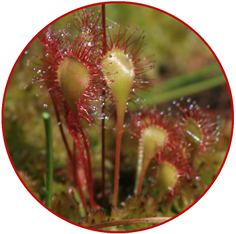|
Restoration
strategies of the deteriorated peatland ecosystems from
Romania
(PeatRO)

Objectives
General objective (aim):
The development of national
strategies for halting the biodiversity loss in
the degraded peatland ecosystems from Romania
Specific objectives:
Objective 1. Identification
and assessment of the areas in need of restoration/reconstruction
Activity 1.1 –
Identification and assessment of the general state
of the peatland ecosystems from
Romania
Activity 1.2 –
Identification and assessment of the main factors
which threaten the good functioning and conservation status of the peatland
ecosystems from
Romania
Activity 1.3 –
Identification of the ecosystem areas affected by
desiccation in
Romania
Activity 1.4 –
Identification of the main areas affected by the
fragmentation of peat habitats from
Romania
Activity 1.5 –
Identification of the invasive species which
require management/control measures
Activity 1.6 –
Identification of the main areas with degraded
peatland ecosystems in need of restoration/reconstruction
Activity 1.7 – Making a
cost-benefit analysis for the
restoration/reconstruction activities
Activity 1.8 –
Identification of the areas with peatland
ecosystems which act as refuges for species of high conservation value
Objective 2. Establishing a national strategy for the restoration of the
hydrological regime in degraded peatland ecosystems
Activity 2.1 – Assessing
the main areas affected by anthropic and/or natural desiccation of peatland
ecosystems from Romania
Activity 2.2 –
Identification of the adequate restoration/reconstruction techniques for the
areas affected by anthropic and/or natural desiccation of peatland
ecosystems from Romania
Activity 2.3 – Restoring
some drained peatland ecosystems. Case study: The protected area Mlaca
Tătarilor (ROSCI0112)
Activity 2.4 – Restoring
some drained peatland ecosystems. Case study: The protected area Larion
(ROSCI0101)
Activity 2.5 –
Developing the national plan for the restoration of the hydrological regime
in degraded peatland ecosystems.
Objective 3.
Establishing a national strategy for the
elimination of invasive species from the
degraded peatland ecosystems
Activity 3.1 –
Assessing the invasive species which should be
controlled
Activity 3.2 – Case
study: the invasive species Betula pendula
Activity 3.3 – Case
study: the invasive species Pinus sylvestris
Activity 3.4 –
Identification of the adequate technologies and methods for the control of
invasive species affecting peatland ecosystems from Romania
Activity 3.5 –
Developing the national plan for the control of
invasive species affecting degraded peatland ecosystems
Objective 4. Establishing a national strategy for restoring the connectivity
between peat habitats
Activity 4.1 – Assessing
the main areas affected by the fragmentation of peat habitats from Romania
Activity 4.2 –
Identification of the adequate technologies and methods for the
restoration/reconstruction of the areas affected by the fragmentation
of peat habitats from Romania
Activity 4.3 –
Developing the national plan for restoring the connectivity between peat
habitats
Objective 5. Developing medium- and long-term strategies for the
conservation of certain species which are characteristic for the peatlands
from Romania
Activity 5.1 –
Developing an assessing system of the conservation status of species which
are typical for peatland ecosystems
Activity 5.2 –
Developing a system for the identification of species with high conservation
value
Activity 5.3 –
Establishing the methodology of selecting the species which are typical for
peatland ecosystems and have a high conservation value, in order to include
them in the national medium- and/or long-term conservation plan
Activity 5.4 – Case
study: Ligularia sibirica
Activity 5.5 –
Identification and establishment of some modern and adequate techniques for
the conservation of endangered species
Activity 5.6 –
Development of the national plan for the medium-term conservation of the
species with high conservation value
Activity 5.7 –
Development of the national plan for the long-term conservation of the
species with high conservation value
Objective 6. Integrating the
results in a common unitary policy for the reconstruction of the degraded
peat habitats from Romania
Activity 6.1 –
Developing a guide for the restoration of the degraded peatlands from
Romania
Activity 6.2 –
Developing a national program for the restoration of the degraded peatlands
from Romania
|

